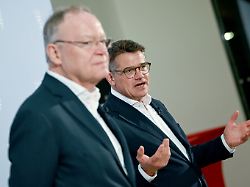It’s going to be a long night: Before the summit meeting between the Prime Ministers and the Federal Chancellor, the state leaders discuss additional demands from the Union camp. The countries make Olaf Scholz wait for more than three hours. The compromise reached does not make it easier to reach an agreement with the federal government.
For months, the federal states have been putting pressure on the federal government for more money in refugee care and for measures to limit immigration. But on the day when they want to present their demands together to Chancellor Olaf Scholz and push them through, the Prime Ministers first split up among themselves. When the state meeting ended in the evening with a three-hour delay, it was important for Lower Saxony’s Prime Minister Stephan Weil to clarify the question of guilt: the federal states governed by the SPD and Thuringia were “surprised” in the morning by an additional list of demands from those states led by the CSU , CDU and the Greens. They partially questioned a paper agreed upon three weeks ago “and also opened up other topics.”
According to SPD Prime Minister Weil, the afternoon was “not really refreshing.” The Hessian Prime Minister standing next to him, the Christian Democrat Boris Rhein, is in a good mood. His camp, that of the so-called B countries, was not able to enforce all of the additional demands put forward. But the A states have joined in on several points: the federal states are now unanimously demanding that the federal government do so.
- to extend the EU-Turkey deal on dealing with Syrian refugees in particular on Turkish soil,
- to limit family reunification for refugees with subsidiary protection status, which primarily refers to Syrian refugees,
- issuing more payment cards instead of cash benefits to asylum seekers,
- to set up a federal-state commission to further develop asylum law.
“Further measures desired”
The Prime Ministers “discussed each other very intensively” and “were able to agree on important points – with all countries,” is Rhein’s conclusion. “I mentioned that the B side wanted further measures.” This includes:
- to declare all countries with a recognition rate of less than 5 percent to be safe countries of origin,
- to amend the asylum law,
- to stop voluntary admission programs announced by the federal government.
And – North Rhine-Westphalia’s Prime Minister Hendrik Wüst brought this into the debate at the weekend – in the future, asylum procedures will also be carried out in third countries and refugees who have entered Germany illegally will be accommodated in these third countries during the procedure.
These demands can now be found in individual declarations from the B states, which are attached to the Prime Minister’s joint list of demands for the federal government. These wishes had already been predominantly raised by the Union parliamentary group in the Bundestag. With their actions on Monday, the B states once again gave the Union’s demands the greatest possible attention.
Conspicuous distancing
However, it was important for Rhein to say that the Union-led states had in no way acted as an extension of the Bundestag faction or CDU chairman Friedrich Merz. These are “points that offer a certain level of congruence at one point or another, but these are points that are particularly important to the countries,” said Rhein.
“If Friedrich Merz could have dictated points to us, then perhaps they would have been other points than these points. I just want to mention the third country question: I don’t have to beat around the bush, they have been following that in the past few days, is particularly a question from the Prime Minister of North Rhine-Westphalia.” Rhein’s statement is likely to raise the question in the coming days as to whether the Union states primarily wanted to emancipate themselves from federal politics – or the camp around Friedrich Merz’s Hendrik Wüst.
Delicate mission for SPD countries
Weil explained, however, why the A states have not fully agreed to the wishes of the Union and Baden-Württemberg, which is governed by the Green Party Winfried Kretschmann, to the federal government. Asylum procedures in transit countries – i.e. countries through which asylum applicants have traveled on their journey to Germany – are conceivable. However, the SPD cannot do anything with a so-called “Rwanda model” after the Chancellor pointed out at the weekend that no African country had so far shown interest in such a role. “Rwanda model” because Great Britain is considering accommodating people who entered the country illegally in Rwanda until their future residence status is clarified in order to prevent them from dangerously entering the country by sea in the future. Wüst argues similarly in his calls for a similar approach to be taken in the EU in the future.
When it came to the question of safe countries of origin, the SPD states probably suspected that expanding the list of such countries would be difficult with the Greens co-governing in the federal government. Weil explained that it would be enough to significantly speed up the asylum process for people from countries with low recognition rates. The voluntary admission program planned for Afghanistan is also important to the Greens and parts of the SPD and for Scholz cannot be brushed aside at a conference with the prime ministers.
The SPD-led states already find themselves in the difficult position of having to negotiate major concessions from SPD Chancellor Scholz in financing refugee care and the Germany ticket. In their previously agreed paper, the states are demanding 10,500 euros from the federal government per refugee. But so far he only wants to give half and points to empty coffers.
“I don’t like to argue, but if I have to,” Weil said belligerently in the evening and emphasized that he was negotiating as Lower Saxony’s Prime Minister, not as a party colleague of the Chancellor. As with the Deutschlandticket, everyone involved expects tough negotiations. A result that night is not guaranteed.
